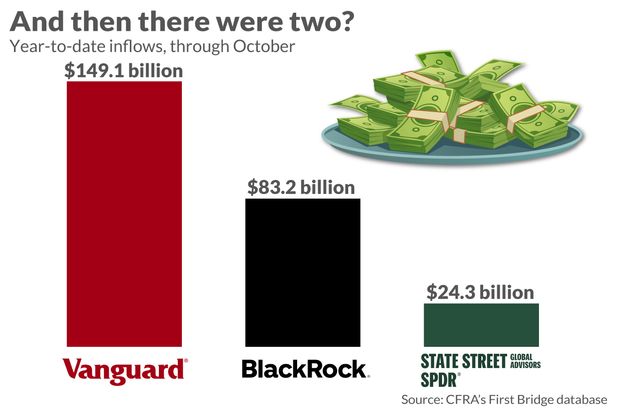
Good things come in threes, it’s often said. But what happens when a formerly tight trio becomes dominated by a power couple?
In the asset-manager world, BlackRock BLK, -1.61%, State Street Global Advisors STT, -2.30%, and Vanguard have been known for the past several years as the “Big Three” behemoths, dwarfing everyone else by a matter of degrees. Their reach was seen as so broad, and so stubborn, that everything from academic studies to op-eds have been written about it.
But more recently, the Big Three has started to seem a bit more like the Big Two.
As the ETF industry has grown and changed, inflows to State Street, the home of the original ETF, have started to lag behind those of its peers.
To be clear, the company is still a giant, with $5.8 trillion of ETF assets under management. But “the gap has been widening” between the money they collect and what’s been rolling into Vanguard and BlackRock “over the last few years,” said Todd Rosenbluth, who heads mutual-fund and ETF research for CFRA.
That’s mainly because ETFs have gained more widespread acceptance among mom-and-pop investors and their advisors, Rosenbluth told MarketWatch. State Street has historically positioned itself for an institutional/trading investor audience willing to pay a slightly higher fee for greater tradability, not buy-and-hold investors looking for broad asset allocation. Among this rising class of investors “fees matter most,” Rosenbluth said.
See: Are ETFs safe… for retail investors?
Another trend working against State Street over the past few years: Growing take-up of fixed-income ETFs, an area that BlackRock’s iShares product suite and Vanguard have dominated. State Street has a bond fund lineup, but it’s much smaller, Rosenbluth noted.
As these trends play out, State Street has responded by launching some lower-cost versions of its popular funds, including one to complement its flagship product, the world’s first ETF, SPY, and the first-ever gold ETF. These steps will likely move the needle somewhat in terms of future flows, Rosenbluth thinks — but Vanguard and BlackRock may have a bit of an edge.
Related: This chart shows how Vanguard’s explosive growth has ‘taken on a life of its own’
“Inflows will continue to be concentrated in firms that offer relatively cheap, diversified products because there’s a snowball effect to that,” he said. “Because they’re designed to track the market they’re going to give the investor a more comfortable experience.”
It’s also hard for a fund family to poach investor assets from competitors in a marketplace like this one. “It’s less likely that money gets yanked from these products because they’re not underperforming,” Rosenbluth said in an interview. “They’re designed to track the performance of a commonly-followed benchmark.”










Add Comment